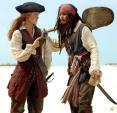| I
protested only weakly when a friend of mine recently suggested the
Pirates of the Caribbean: Dead Man’s Chest, for our
evening’s entertainment. After all, we were on vacation, it
was beastly hot—and the original was entertaining, with sparkling
performances by Johnny Depp and ensemble. There are movies and there
are films, I always say; why not this Pirates movie? At
two and a half hours, though, this sequel is simply too long and
crammed too full with new, meandering story lines, incomprehensible,
endless expository dialogue, and a tacked on surprise ending that
serves no purpose except as a cliffhanger for yet another sequel,
currently filming. There are moments, of course--Depp still charms,
pratfalls amuse, young lovers pine--but not enough of them, for
most adult viewers.
 As
we pushed on into hour two, I ceased trying to decipher the dialogue
of voodoo priestess (Naomi Harris) over the oppressive music score,
and my mind began to wander . . . to an article I read by Wired
editor, Chris Anderson, about the online business theory he dubs
The Long Tail. In a nutshell, he theorizes that online
businesses like Amazon or I-tunes can earn more money marketing
non-hits to lots of people than hits to a few because the cost of
distribution is so low, and because peer-to-peer reviews like “people
who liked this also liked this” instantly create demand for
non-hits, thereby creating steady sales (the long tail) instead
of spikes. As
we pushed on into hour two, I ceased trying to decipher the dialogue
of voodoo priestess (Naomi Harris) over the oppressive music score,
and my mind began to wander . . . to an article I read by Wired
editor, Chris Anderson, about the online business theory he dubs
The Long Tail. In a nutshell, he theorizes that online
businesses like Amazon or I-tunes can earn more money marketing
non-hits to lots of people than hits to a few because the cost of
distribution is so low, and because peer-to-peer reviews like “people
who liked this also liked this” instantly create demand for
non-hits, thereby creating steady sales (the long tail) instead
of spikes.
 Moviemakers, however, need to aggregate their audiences
in physical space and time. Thus the opening weekend box office
begets the “tyranny of the hit.” But don’t count
Disney out--their business model adapts with the times, and their
Pirates trilogy is an intentional hybrid of both types
of marketing. Pirates serves as a mega-hit, yes, if Disney’s
lucky, but also, more importantly perhaps, as a loss leader to introduce
fans to a Pirates culture that begins with movies strung out over
three seasons and ends with a click, many clicks, on their online
shopping site. Soon the kids will want to sleep on Pirates sheets,
play with Pirates toys, and to go to Disneyland itself (where the
Depp character has been added to the original ride). I for one see
nothing sinister in all this—okay, maybe the $250 Jack Sparrow
Flintlock Gun Replica is a bit over the top—and I actually
admire producer Jerry Bruckheimer and his genius for marketing. Moviemakers, however, need to aggregate their audiences
in physical space and time. Thus the opening weekend box office
begets the “tyranny of the hit.” But don’t count
Disney out--their business model adapts with the times, and their
Pirates trilogy is an intentional hybrid of both types
of marketing. Pirates serves as a mega-hit, yes, if Disney’s
lucky, but also, more importantly perhaps, as a loss leader to introduce
fans to a Pirates culture that begins with movies strung out over
three seasons and ends with a click, many clicks, on their online
shopping site. Soon the kids will want to sleep on Pirates sheets,
play with Pirates toys, and to go to Disneyland itself (where the
Depp character has been added to the original ride). I for one see
nothing sinister in all this—okay, maybe the $250 Jack Sparrow
Flintlock Gun Replica is a bit over the top—and I actually
admire producer Jerry Bruckheimer and his genius for marketing.
 Screenwriters
Terry Rossio and Ted Elliott have proven their comedic writing chops
from Aladdin to Mask of Zorro to Pirates—I hope their success
opens doors for a funny, adult, art-for-art’s sake film, too.
In the meantime, the critical word is out: POTC is dead
in the water. But no one is listening. Critics are puzzled; when
did they become irrelevant? As NYT’s A. O. Scott lamented,
“We take entertainment every seriously, which is to say that
we don’t go to the movies for fun...” Which is to say,
the exact opposite of why most children, most people, go to the
movies. If you were a kid, whose peer-to-peer recommendation would
you seek—your friends’ or A. O. Scott’s? Chris
Anderson knows the answer. Walt Disney would, too, if he were here. Screenwriters
Terry Rossio and Ted Elliott have proven their comedic writing chops
from Aladdin to Mask of Zorro to Pirates—I hope their success
opens doors for a funny, adult, art-for-art’s sake film, too.
In the meantime, the critical word is out: POTC is dead
in the water. But no one is listening. Critics are puzzled; when
did they become irrelevant? As NYT’s A. O. Scott lamented,
“We take entertainment every seriously, which is to say that
we don’t go to the movies for fun...” Which is to say,
the exact opposite of why most children, most people, go to the
movies. If you were a kid, whose peer-to-peer recommendation would
you seek—your friends’ or A. O. Scott’s? Chris
Anderson knows the answer. Walt Disney would, too, if he were here.
--
Patricia Ducey
 |



